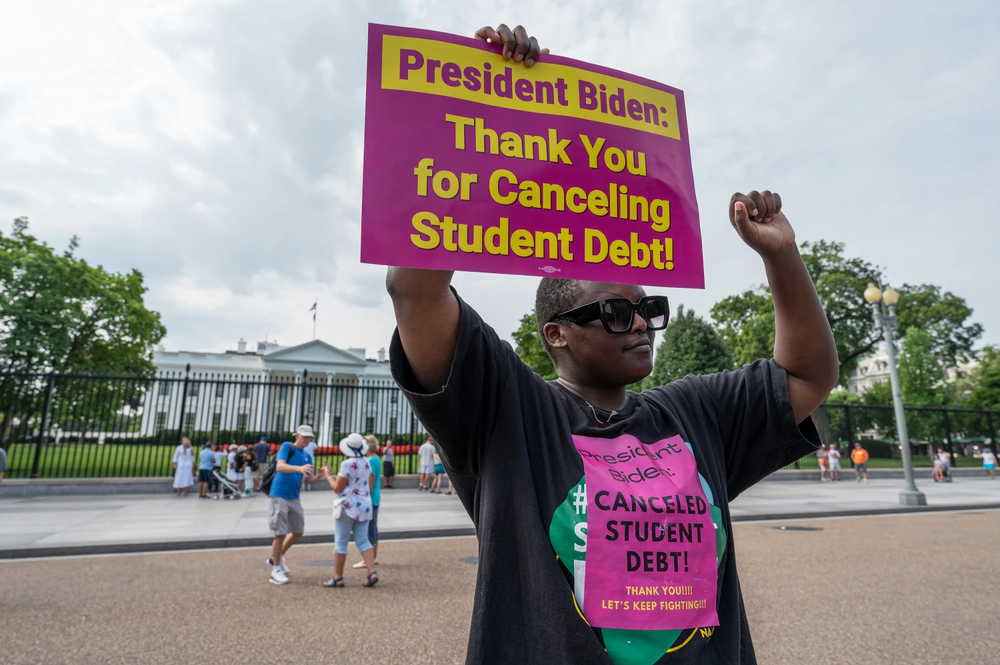Adrianne is a college admissions consultant and TV/film director, producer, writer, and actress currently based in LA. She uses her experience in multiple disciplines to help students achieve their personal and academic goals.
In August, Biden’s administration announced a plan to forgive student debt for many Americans, but several recent legal challenges have made the future of this plan unclear. Here’s what’s currently happening with student loan repayment and what that might mean for you.

Recently, President Biden announced a plan to forgive up to $1.6 trillion dollars in student debt nationwide, which would offer significant relief to many Americans struggling with thousands of dollars in loans years after graduating college. However, shortly after the loan forgiveness application opened, the plan was thrown into limbo pending the results of several lawsuits.
As a result, the Biden administration has extended the student loan payment pause, which may mean the payments will resume as early as January, or the pause could continue well into 2023. Many of the 26 million borrowers who have applied for debt forgiveness thus far are understandably frustrated with the delay.
If you or someone you know has been thrown into limbo by these changes to the student loan forgiveness plan, read on to find out what this might mean over the coming year.
What are the lawsuits that are affecting student loan forgiveness?
As of November 2022, there are several lawsuits that are presenting challenges to Biden’s student debt relief plan. One of the most notable is backed by six Republican-led states who argue that Biden should have sought approval from Congress instead of invoking the 2003 Heroes Act, which allows for student loan forgiveness during periods of nationwide hardship or emergency.
Despite the fact that the Department of Justice ruled Biden’s move constitutional back in August, a federal judge in Texas ruled the forgiveness plan “unconstitutional.” The Biden administration has appealed both rulings and will continue to push back against all challenges.
There are other lawsuits brought by various individuals and institutions, including Arizona’s attorney general and the Cato Institute, a libertarian think tank, and several more legal challenges have been denied. The Biden administration has been adamant that the challenges have no merit, but the resolution to each of these lawsuits may take several months.
If I’ve already applied for student loan forgiveness, what does this mean for me? When might student loan payments resume?
As mentioned above, the student loan payment pause that went into effect during the pandemic will likely continue well into the next year as these lawsuits play out in court.
If these lawsuits are resolved or Biden’s original forgiveness plan is put into place, borrowers will have 60 days after that before their payments resume. If not, the pause will last until June of 2023, and you will have 60 days after that before payments start back up again.
For some borrowers, it might be in your best interest to consider refinancing your loans now. According to CNBC: “Higher education expert Mark Kantrowitz had previously recommended that, despite the chance of picking up a lower interest rate, federal student loan borrowers should refrain from refinancing their debt with a private lender… Now that borrowers know how much in loan cancellation is coming — assuming the president’s policy survives in the courts — borrowers may want to consider the option now, Kantrowitz said. With the Federal Reserve expected to continue raising interest rates, he added, you’re more likely to pick up a lower rate with a lender now than later.”
However, this is likely not the best option for all borrowers, so thoroughly consider all possible ramifications of this option in the context of your own finances.
What does this mean if I’m considering taking out student loans in the future?
For prospective undergraduate students who might take out loans, this doesn’t mean too much. There is no guarantee that the debt forgiveness plan will continue if implemented, but if any of the lawsuits are successful, there will likely not be any debt forgiveness in the future.
Many were hoping this would set a precedent for student loan forgiveness in the future since student debt is becoming a mounting issue in the American education system. However, it would be wise to understand that repaying these student loans could be a lifelong endeavor, and interest rates are only likely to increase over time — any potential debt forgiveness from the government shouldn’t be counted on as a method of repayment.
If you’re looking for help with financial aid or general guidance during the college admissions process, don’t hesitate to set up a free consultation with our college admission consultants today!



